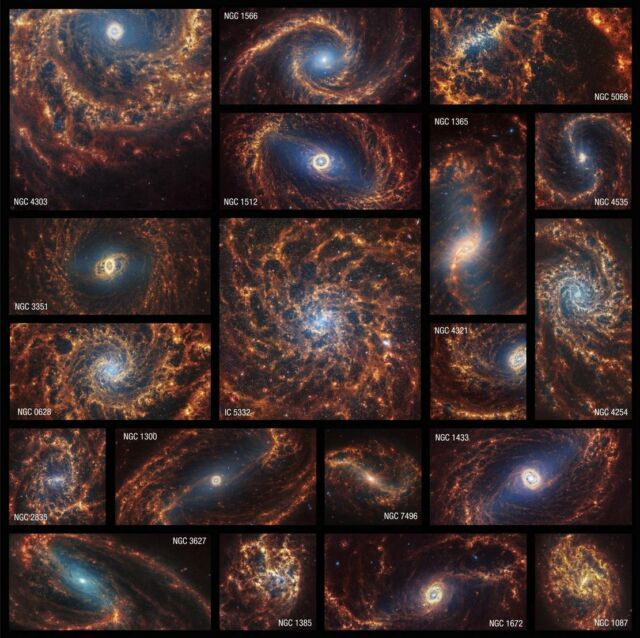 NASA, ESA, CSA, STScI, J. Lee (STScI), T. Williams (Oxford), PHANGS Team
NASA, ESA, CSA, STScI, J. Lee (STScI), T. Williams (Oxford), PHANGS Team
James Webb Space Telescope reveals stunning collection of 19 spiral galaxy images in never-before-seen details.
The James Webb Space Telescope has unveiled a stunning collection of images featuring 19 spiral galaxies, showcasing stars, gas, and dust in unprecedented detail beyond the Milky Way.
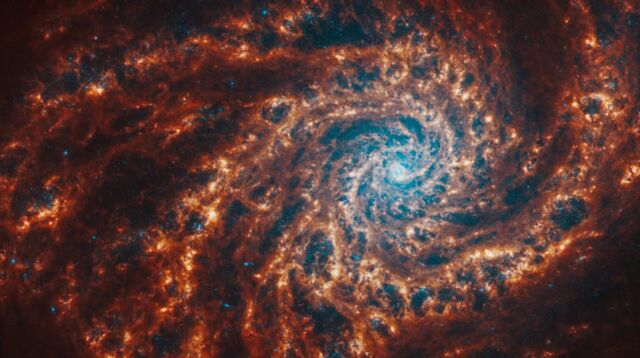 Spiral Galaxy NGC 4254. NASA, ESA, CSA, STScI, J. Lee (STScI), T. Williams (Oxford), PHANGS Team
Spiral Galaxy NGC 4254. NASA, ESA, CSA, STScI, J. Lee (STScI), T. Williams (Oxford), PHANGS Team
These captivating portraits, taken in near and mid-infrared light, offer a close-up look at the intricate structures of these galaxies.
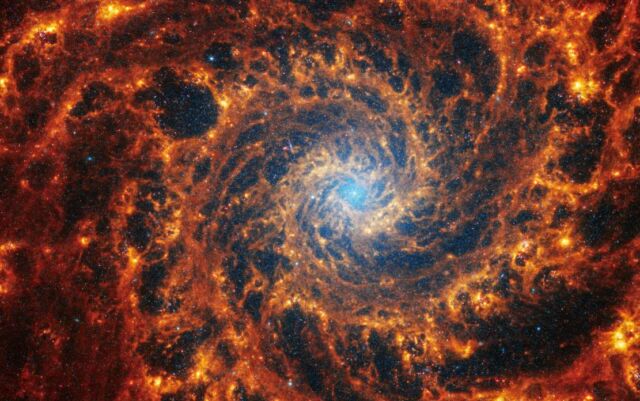 Spiral Galaxy NGC 628. NASA, ESA, CSA, STScI, J. Lee (STScI), T. Williams (Oxford), PHANGS Team
Spiral Galaxy NGC 628. NASA, ESA, CSA, STScI, J. Lee (STScI), T. Williams (Oxford), PHANGS Team
Scientists are analyzing these images to unravel the mysteries of the galaxies’ origins. The collective insights gained from this research will contribute to refining theoretical simulations, enhancing our understanding of how spiral galaxies evolve.
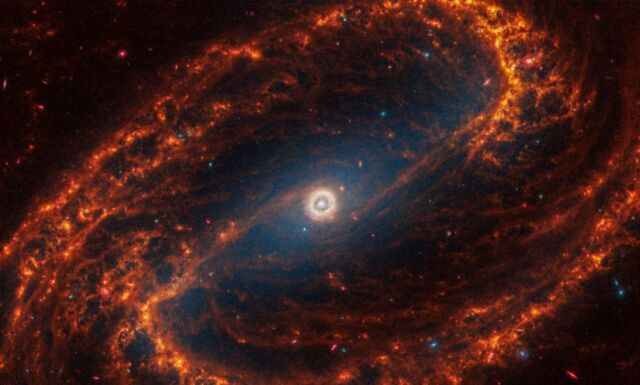 Spiral Galaxy NGC 1300. NASA, ESA, CSA, STScI, J. Lee (STScI), T. Williams (Oxford), PHANGS Team
Spiral Galaxy NGC 1300. NASA, ESA, CSA, STScI, J. Lee (STScI), T. Williams (Oxford), PHANGS Team
By tracing the clearly defined arms of each galaxy, loaded with stars, scientists may discover old star clusters and active supermassive black holes.
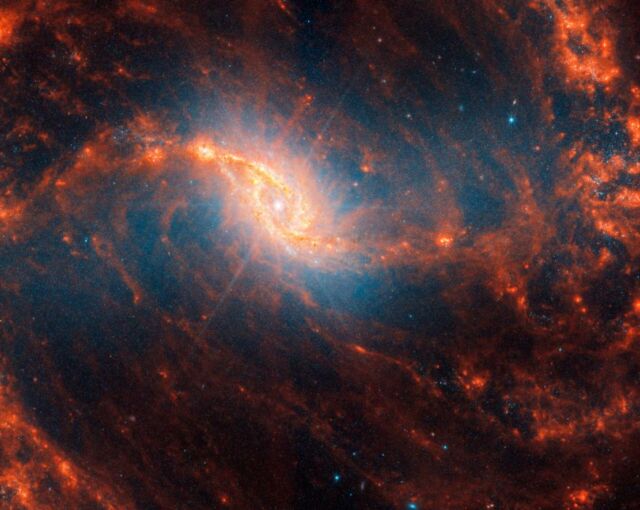 Spiral Galaxy NGC 1365. NASA, ESA, CSA, STScI, J. Lee (STScI), T. Williams (Oxford), PHANGS Team
Spiral Galaxy NGC 1365. NASA, ESA, CSA, STScI, J. Lee (STScI), T. Williams (Oxford), PHANGS Team
These galaxy images are part of the Physics at High Angular Resolution in Nearby GalaxieS (PHANGS) program, a comprehensive project supported by over 150 astronomers worldwide. Before Webb’s contribution, PHANGS had already accumulated a wealth of data from telescopes such as the NASA/ESA Hubble Space Telescope, the Very Large Telescope’s Multi-Unit Spectroscopic Explorer, and the Atacama Large Millimeter/submillimeter Array.
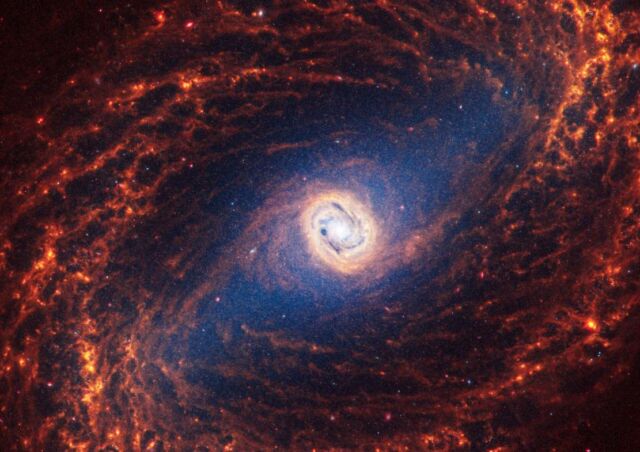 Spiral Galaxy NGC 1433. NASA, ESA, CSA, STScI, J. Lee (STScI), T. Williams (Oxford), PHANGS Team
Spiral Galaxy NGC 1433. NASA, ESA, CSA, STScI, J. Lee (STScI), T. Williams (Oxford), PHANGS Team
Webb’s Near-Infrared Camera (NIRCam) has captured millions of stars in these images, illuminating them in shades of blue. Some stars are scattered throughout the spiral arms, while others form dense clusters. Additionally, the Mid-Infrared Instrument (MIRI) data from the telescope spotlights glowing dust, revealing its presence behind, around, and between stars. MIRI also showcases stars in the early stages of formation, still enveloped in gas and dust, resembling bright red seeds atop dusty peaks.
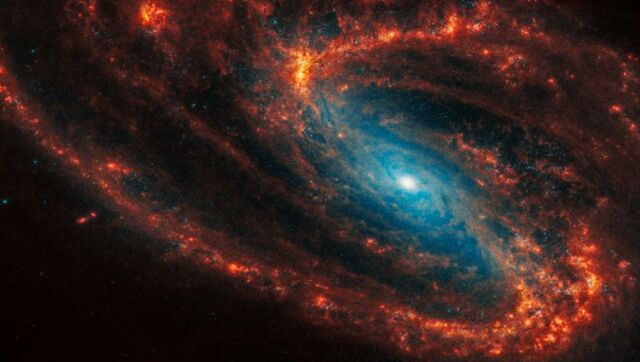 Spiral Galaxy NGC 3627. NASA, ESA, CSA, STScI, J. Lee (STScI), T. Williams (Oxford), PHANGS Team
Spiral Galaxy NGC 3627. NASA, ESA, CSA, STScI, J. Lee (STScI), T. Williams (Oxford), PHANGS Team
Webb is an international partnership between NASA, ESA, and the Canadian Space Agency (CSA).
source ESA

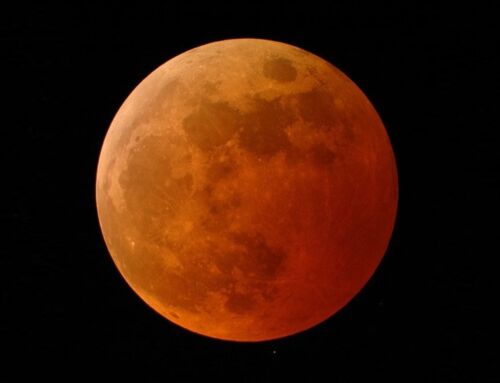

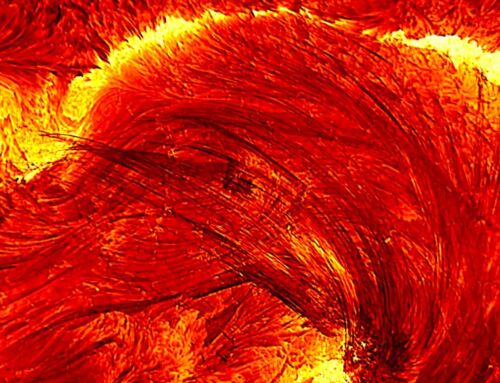
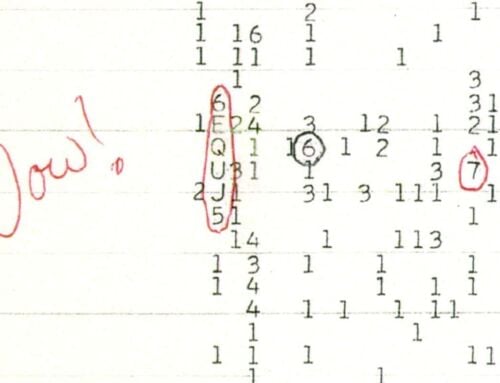
Leave A Comment